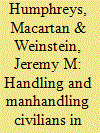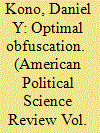|
|
|
Sort Order |
|
|
|
Items / Page
|
|
|
|
|
|
|
| Srl | Item |
| 1 |
ID:
074850


|
|
|
|
|
| Publication |
2006.
|
| Summary/Abstract |
We propose and test a theory of opportunities that explains the conditions in which economic status affects support for racial and ethnic group interests among African Americans, Latinos, and Asian Americans. Using data from a 2001 Washington Post/Kaiser Family Foundation/Harvard University national survey, our analysis finds that, for all minority groups, the effect of economic status on support for group interests is mediated by the socioeconomic experiences of individuals. Intergroup differences therefore result from varying experiences and perceptions of discrimination among minority groups rather than from group-specific theoretical processes. Compared to Latinos and Asian Americans, African Americans are least responsive to changes in economic circumstances because they are on the whole more pessimistic about their life prospects and more likely to encounter discrimination. But we find in general that, among those minority individuals who perceive equal opportunity and experience less discrimination, higher economic status often leads to a reduced emphasis on race and ethnicity. These results demonstrate that the incorporation of a minority group into American society depends not only on the actions of group members but also on the fair treatment of that group by the majority population.
|
|
|
|
|
|
|
|
|
|
|
|
|
|
|
|
| 2 |
ID:
074856


|
|
|
|
|
| Publication |
2006.
|
| Summary/Abstract |
The toll of civil conflict is largely borne by civilian populations, as warring factions target non-combatants through campaigns of violence. But significant variation exists in the extent to which warring groups abuse the civilian population: across conflicts, across groups, and within countries geographically and over time. Using a new dataset on fighting groups in Sierra Leone, this article analyzes the determinants of the tactics, strategies, and behaviors that warring factions employ in their relationships with noncombatants. We first describe a simple logic of extraction which we use to generate hypotheses about variation in levels of abuse across fighting units. We then show that the most important determinants of civilian abuse are internal to the structure of the faction. High levels of abuse are exhibited by warring factions that are unable to police the behavior of their members because they are more ethnically fragmented, rely on material incentives to recruit participants, and lack mechanisms for punishing indiscipline. Explanations that emphasize the importance of local community ties and contestation do not find strong support in the data.
|
|
|
|
|
|
|
|
|
|
|
|
|
|
|
|
| 3 |
ID:
074852


|
|
|
|
|
| Publication |
2006.
|
| Summary/Abstract |
A growing body of research shows that democracies have more liberal trade policies than do autocracies. I argue, in contrast, that democracy has contradictory effects on different types of trade policies because electoral competition generates more information about some than about others. It generates considerable information about policies whose effects on consumer welfare are easy to explain to voters, but less information about policies whose effects are more complex. By increasing the transparency of some policies relative to others, democracy induces politicians to reduce transparent trade barriers but also to replace them with less transparent ones. I test this hypothesis by examining the impact of democracy on tariffs, "core" nontariff barriers (NTBs) such as quotas, and "quality" NTBs such as product standards in 75 countries in the 1990s. I find that democracy leads to lower tariffs, higher core NTBs, and even higher quality NTBs. I conclude that democracy promotes "optimal obfuscation" that allows politicians to protect their markets while maintaining a veneer of liberalization.
|
|
|
|
|
|
|
|
|
|
|
|
|
|
|
|
| 4 |
ID:
074851


|
|
|
|
|
| Publication |
2006.
|
| Summary/Abstract |
This paper examines the impact of the form of government-presidential or parliamentary-on fiscal outcomes in democratic systems. Based on data for democracies in 98 countries between 1970 and 2002, it shows that the gross domestic product ratio of the central government budget balance is higher in presidential than in parliamentary democracies. It also shows that this impact is not due to the fact that presidential systems are not subject to the "costs of coalition" that allegedly afflict parliamentary democracies: the coalition and status of the government are of no consequence for budget balances in either presidential or parliamentary systems. Presidential systems matter for budget balances because they generate relatively high incentives for governments to keep budgets under control. They do so because in presidential systems, unlike in parliamentary systems, voters are by design able to identify and punish those responsible for economic policies. Presidents, however, vary in their capacity to affect budget policies. This paper demonstrates that presidential systems in which presidents are constitutionally able to dominate the budget process or to effectively veto legislation tend to have higher budget balances than those in which the budget process is dominated by the legislature or the president is unable to exercise existing veto powers.
|
|
|
|
|
|
|
|
|
|
|
|
|
|
|
|
| 5 |
ID:
074853


|
|
|
|
|
| Publication |
2006.
|
| Summary/Abstract |
Racist and liberal ideals are said to anchor competing political traditions in America, but a juxtaposition of ideals obscures key processes of change in the cultural lexicon and misses much about how a political tradition comes to bear on the development of a polity. Attention to the reassociation of ideas and purposes over time points to a more intimate relationship between racism and liberalism in American political culture, to the conceptual interpenetration of these antithetical ends. Cuing off issues that have long surrounded the reassociation of John C. Calhoun's rule of the concurrent majority with pluralist democracy, this article examines another southerner, Woodrow Wilson, who, in the course of defending racial hierarchy, developed ideas that became formative of modern American liberalism. Analysis of the movement of ideas across purposes shifts the discussion of political traditions from set categories of thought to revealed qualities of thought, bringing to the fore aspects of this polity that are essentially and irreducibly "American."
|
|
|
|
|
|
|
|
|
|
|
|
|
|
|
|
| 6 |
ID:
074855


|
|
|
|
|
| Publication |
2006.
|
| Summary/Abstract |
Considerable debate exists over the impact of redistricting on the partisan composition of the U.S. Congress. I address this debate by turning to an era of congressional redistricting that has received little systematic attention—the politics of gerrymandering in the 19th century. Using statewide-, county-, and ward-level electoral data from 1870 to 1900, I show that when a single party controlled the districting process, they used districting to systematically engineer a favorable partisan bias. These partisan biases affected the partisan composition of state congressional delegations and at times even helped determine party control of the House of Representatives.
|
|
|
|
|
|
|
|
|
|
|
|
|
|
|
|
| 7 |
ID:
074857


|
|
|
|
|
| Publication |
2006.
|
| Summary/Abstract |
Mediation is one of the most widespread techniques for preventing conflict and promoting cooperation. I examine the conditions under which mediators can facilitate cooperation by building trust between two parties. Assuming mediators have no intrinsic commitment to honesty, they can be credible trust builders in one-round interactions only if they care about the issue at stake, have a moderate ideal point, and do not find conflict to be too costly. A mediator that is solely interested in promoting cooperation, or one that is biased toward one side, will be ineffective. A desire to preserve a reputation for honesty can overcome a limited amount of bias or issue indifference.
|
|
|
|
|
|
|
|
|
|
|
|
|
|
|
|
| 8 |
ID:
074854


|
|
|
|
|
| Publication |
2006.
|
| Summary/Abstract |
Plurality-based elections between two major parties or candidates sometimes feature small, centrist, third parties. We modify the standard two-party spatial model of policy-seeking parties to incorporate a centrist third party, and we show that the presence of such a party-even if it has no chance of winning-motivates the major parties to propose policies that are much more divergent than without the third party. We derive explicit formulas for party locations at a three-party equilibrium and provide necessary and sufficient conditions for existence of that equilibrium. We show that, over time, the major parties can be expected to shift their policies in the same direction relative to each other but in the opposite direction relative to the minor party. The predictions of this model are compared with estimates of party policy locations during appropriate periods in postwar Britain.
|
|
|
|
|
|
|
|
|
|
|
|
|
|
|
|
|
|
|
|
|